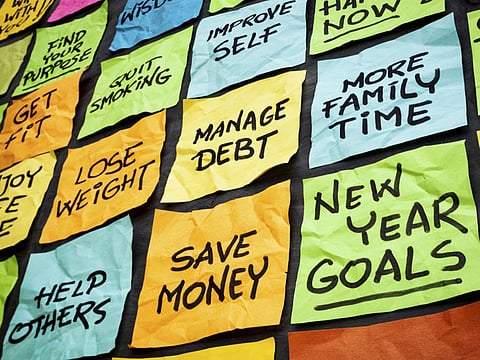Why New Year's resolutions always fail
Unlock the psychology behind resolutions to make lasting changes in 2025 and beyond

With January 2025 underway, millions around the globe are already a week into their New Year’s resolutions. These promises, often centred around self-improvement like exercising more, eating healthier, or quitting bad habits, symbolise fresh starts. Yet, studies show that most resolutions fail within weeks, raising the question: why do people make these resolutions, and why do they often struggle to fulfil them?
The allure of New Year’s resolutions is rooted in the psychological power of temporal landmarks. Psychologists call this the “fresh start effect,” where specific dates, like Jan. 1, inspire individuals to mentally separate their past selves from their future aspirations. The new year represents a clean slate, evoking optimism and a sense of control over one’s purpose.
Resolutions also tap into a universal desire for growth and self-betterment. They allow people to articulate goals, create purpose, and align their actions with an ideal self-image. Social influences, including peer encouragement and societal norms, also drive people to set resolutions, making the process feel like a ritual — a declaration of hope and commitment to change.
Why Do New Year’s Resolutions Fail?
Despite the enthusiasm surrounding resolutions, their success rate is discouragingly low. Research from the University of Scranton suggests that only 8% of people achieve their New Year’s goals. Several psychological factors contribute to this high failure rate.
1. Overambitious Goals
One of the primary reasons resolutions fail is setting goals that are overly ambitious. Phrases like “I’ll be completely organised this year” are often unrealistic. The higher the expectations, the lower the chances of success. Instead, try setting specific, measurable goals such as “organise one room each week.”
2. The Illusion of Willpower
Willpower is often seen as the key to achieving resolutions, but it is a limited resource. Behavioural psychology suggests that self-control functions like a muscle — it can be strengthened, but it also gets fatigued. Relying solely on willpower can lead to burnout, especially when people fail to create supportive systems. Instead, building habits and seeking external motivation can help maintain momentum.
3. The Role of Habits and Identity
Resolutions frequently fail because they conflict with an individual’s existing habits or self-identity. For example, if someone views themselves as a “non-exerciser,” they will struggle to adopt an exercise routine, no matter how motivated they are. Identity plays a central role in behaviour change, and resolutions that don’t align with self-identity are often short-lived. It’s important to set resolutions that align with who you are or want to be.
4. Cognitive Dissonance and Rationalisation
Cognitive dissonance occurs when our actions conflict with our stated goals, creating psychological discomfort. Instead of motivating change, this discomfort can lead to rationalisations. For instance, skipping one workout might be justified as “just this once,” leading to excuses that ultimately cause the resolution to fail. Recognising and addressing these rationalisations early on can prevent this pattern.
A More Mindful Approach to New Year’s Resolutions in 2025
To make resolutions more than fleeting promises, we need to understand the psychological dynamics at play and approach them with intention. In 2025, the focus should be on sustainable change, achievable goals, and understanding our minds more deeply.
1. Shift from Resolution to Habit Formation
Instead of focusing solely on results like “lose 20 kilograms” or “become fluent in Spanish,” shift to process-oriented goals that Centre around habit formation. Small, manageable changes can be incorporated into your daily routine. For instance, aim to “walk for 30 minutes every day” rather than making vague goals about exercise.
2. Use SMART Goals and Mental Flexibility
The SMART framework — specific, measurable, achievable, relevant, and time-bound — helps set clear goals. However, 2025 calls for more mental flexibility. Goals should allow for adjustments as needed. The ability to adapt to challenges instead of rigidly sticking to a plan can foster long-term resilience and reduce the risk of failure.
3. Reframe Failure as Feedback
Instead of viewing setbacks as failures, embrace them as opportunities for growth. A missed workout should be seen as a learning opportunity, not a reason to abandon the goal. Reframing failure as feedback helps build resilience and reduces the psychological discomfort that can lead to giving up.
4. Leverage Social Support and Accountability
Social support is a powerful motivator. Having an accountability partner, sharing goals with friends or family, or joining a group that shares similar aspirations significantly increases the likelihood of success. In 2025, consider using technology to stay accountable, such as apps, online communities, or social media groups, for motivation.
As we embark on the journey of self-improvement in 2025, let’s approach resolutions with a psychological understanding. Rather than relying on willpower alone or aiming for lofty goals, focus on building sustainable habits, celebrating small wins, and understanding the psychological factors at play. By setting realistic, habit-based goals, and creating a supportive and compassionate environment, we can turn resolutions into real, lasting changesMaram Saleh, a Bahraini law student, finds inspiration in the realms of research and writing


